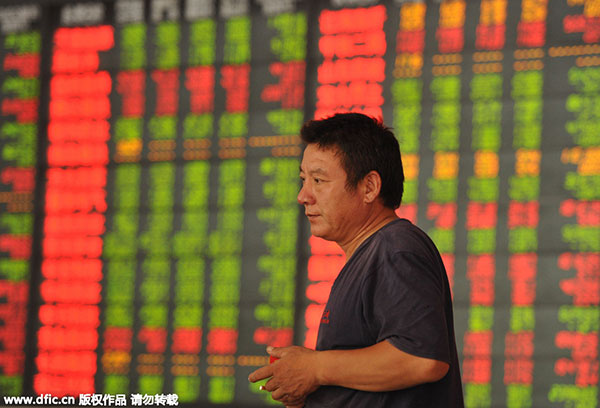Parallel universe
Updated: 2015-07-31 08:26
By Andrew Moody(China Daily Europe)
|
|||||||||||
 |
|
Investors look downcast at a brokerage house in Fuyang city, East China's Anhui province, July 30, 2015. [Photo/IC] |
Research by Goldman Sachs suggests there is very little correlation between the performance of any country's stock markets and its economy and that nowhere has that been more true than in China.
It points out that China's economy has outgrown that of the US by 8 percent a year since 1992 but its equity market has lagged behind that of the US by 8 percent a year - an almost perfect negative correlation.
John Ross, senior fellow at Chongyang Institute for Financial Studies, Renmin University of China, says this is not just the pattern in China but everywhere.
"The faster an economy grows the worse its stock market does over the longer term. There is, in fact, this negative correlation. This is not just the result of one study but all studies," he says.
"Over the shorter term, there tends to be more of a positive correlation, but in China the share market is so peripheral to China's economy. It is a bit like a feather floating around in the air, compared to the effects of interest rate cuts and reserve requirement ratio shifts."
Zhu Ning, deputy director of the Shanghai Advanced Institute of Finance and one of China's most respected finance experts, does not believe there is anything to be celebrated about the stock market and the economy not being in tandem, if that is the case.
"If share prices are totally unrelated to the Chinese economy, then what that tells is that the Chinese stock market is a failure, purely a gambling market, rather than based on information. There really ought to be some connection," he says.
Zhu thinks the emergency measures the Chinese government has taken to stabilize the market over the past few weeks such as limiting short selling, banning margin trading (borrowing money to buy shares), direct stock purchases and emergency interest rate cuts, send the wrong message.
Today's Top News
Realty firms in Europe brace for influx of Chinese buyers
Malaysia seeks help to widen search for MH370
Beijing to ban vehicles for V-Day parade
China's Bohai bids $2.6 billion for aircraft leasing firm Avolon
Rule covers HIV as work hazard
Probable MH 370 debris to be studied in Toulouse
Beijing makes it, again!
Graft probe into Guo Boxiong to win army, public's support
Hot Topics
Lunar probe , China growth forecasts, Emission rules get tougher, China seen through 'colored lens', International board,
Editor's Picks

|

|

|

|

|

|






